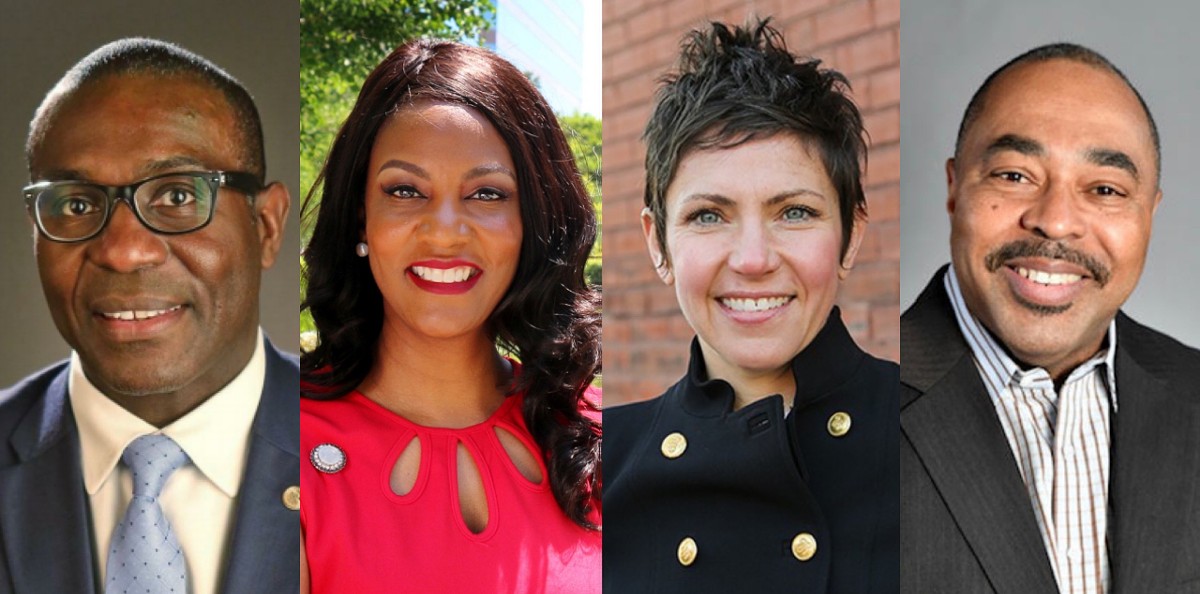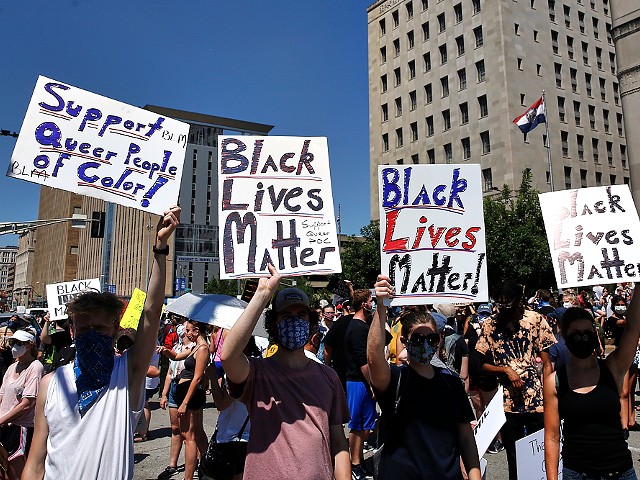The Businessman: Andrew Jones
Andrew Jones says he has the skills — a particular set of skills — St. Louis needs in its next mayor.
"Pretty much like the movie Taken, where the gentleman said I have a unique set of skills to put me in a position to help lead the city in the turnaround that's needed," he says, one of three times he would reference the Liam Neeson action thriller while speaking to the Riverfront Times.
Jones is an outlier in the four-way race for mayor. He's the only candidate who isn't in city government and the only registered Republican, although that's a political distinction he detests.
In a wide-ranging interview, the 60-year old businessman discussed his thoughts on the city's crime problem, Confederate monuments, the recent jail uprisings and his faith in the 'bootstraps' model for reaching Taken-level success.
Jones, a Metro East native, grew up in a typical working-class family in East St. Louis and attended Catholic school until college at Lincoln University and later Washington University, where he is currently working toward another master's in economics. He plans to obtain his Ph.D. in economics "before I'm gone from the planet," he says.
Jones now lives in the Botanical Heights neighborhood and serves as vice president of business development at the nonprofit power company Southwestern Electric Cooperative. He ran for mayor in 2017 as the Republican candidate and lost by 50 percentage points to then-Alderwoman Lyda Krewson, but he otherwise has little political experience. Instead, he relies on his can-do attitude to sway undecided voters.
"My background has been one of success, one of actually pulling oneself up by their bootstraps ... As I spoke earlier, in the movie Taken, 'I have a unique set of skills' that puts me in a position to be able to help turn this city around."
Pressed on whether the "pull oneself up by their bootstraps" model really works for everyone (critics argue that it ignores systemic inequalities and puts the blame on oppressed people for not being more successful), Jones says that "if I am a rat catcher in India, my plight is set in stone," but because of the "phenomenal" system in the United States, anyone in this country can be successful if they simply work hard enough.
Jones includes those who "grew up as a Black person in the United States of America," like himself.
"I believe my ancestors would be turning over in their graves, looking at the lack of productivity that current Black folks to a large degree have put themselves in," Jones says.
Jones says St. Louis is currently "at the point of falling into an abyss," comparing our plight to that of infamously bleak Gary, Indiana. He blames the city's current leadership, "or lack of leadership."
Jones insists if he had been mayor the past four years instead of Krewson, he would've handled many things differently. Off the top of his head, Jones' first major change would've been Krewson's response to taking down confederate statues. He contrasts the situation with reminders of Nazi concentration camps in Germany.
"If we go to Auschwitz, no one's talking about tearing down any of the buildings that were associated with the deaths of millions of Jews ... Jews are there, they're looking in remembrance, and understanding what happened. ... Others that travel and go there, even if they're sub-groups, Germans or whatever you wanna say, they go to Auschwitz, they look, and they pay reverence to the fact in history that this took place," he says.
Instead of a "knee-jerk" reaction, Jones says he would've assessed whether the statues should be taken down, and that public opinion wouldn't have much weight in the decision-making process.
Jones also believes the recent prison protests at the St. Louis Justice Center would've gone down differently if he were in charge. In fact, he says they wouldn't have happened.
"We would've never gotten there, because my No. 1 position is that we should not close the Workhouse because we have not had data to substantiate closing the Workhouse. I've said it four years ago; I'm lamenting it now, when everyone's saying we should close it," he says.
Activist organizations have put together detailed reports on the closing the 55-year-old jail — officially known as the Medium Security Institution — including budget breakdowns for redirecting funding towards better staffing at the new downtown jail and social programs to combat the roots of crime as they push city officials to move forward with closure plans. Through the pandemic, the city's jail population decreased sharply and the majority of remaining detainees were shifted to the City Justice Center.
Jones says that he would have kept the Workhouse fully operating to head off any overcrowding at the City Justice Center. He claims that this would have prevented the protests. Advocates for detainees say the inmates were revolting against a range of problems, including inadequate COVID-19 protections and harsh treatment by guards. City officials deny those incarcerated in the jail have been mistreated and align with Jones on the theme of overcrowding.
"Four years ago, if I had been mayor, I would've taken care of that issue so that we could move on to the more pressing things, like providing optimum municipal services to our citizens," Jones explains.
Jones, who along with Board of Alderman President Lewis Reed has been endorsed by the St. Louis Police Officers Association, has made ending violent crime the focus of his campaign, saying that "after you get that done, everything else falls in line."
However, when asked how he would accomplish that, Jones struggles for specifics. He says increasing police funding and backing the blue could be vital. Jones also says that most violent crimes in St. Louis are committed by a small group of people, all of whom are involved with drugs and gangs. He believes that current city leadership knows exactly who these offenders are but they're too afraid of political backlash to have them arrested.
In Jones' telling, city officials worry about pushback after "all the things that happened this summer, from people burning and rioting in all of these cities because of George Floyd's issue and the other things that have happened. They don't want that backlash."
If he had the opportunity, Jones says, he would arrest them all on his first day in office, as these criminals "can't be saved by social workers" or even "Dr. Phil." It's unclear how he would make that happen.
Jones' positions break sharply from the platforms of the other candidates in the race, particularly Alderwoman Cara Spencer and Treasurer Tishaura Jones who support closing the Workhouse and have advocated for criminal justice reform as opposed to a police crackdown. While promoting conservative Republican talking points (largely the same platform from his 2017 mayoral run), he insists he is a non-partisan candidate.
So far, he's tracking behind his opponents. A recent poll by Democratic consulting group Show Me Victories showed him in last place with 5 percent of respondents naming Jones as their first choice.
Jones is undeterred. He says, "I will continue to be successful at any endeavor that I get involved with."
— Riley Mack
Editor's note: This story was altered after publication to correct the number of Lewis Reed siblings and to note that his campaign contests the story's description of his role in the fight over airport privatization back.







